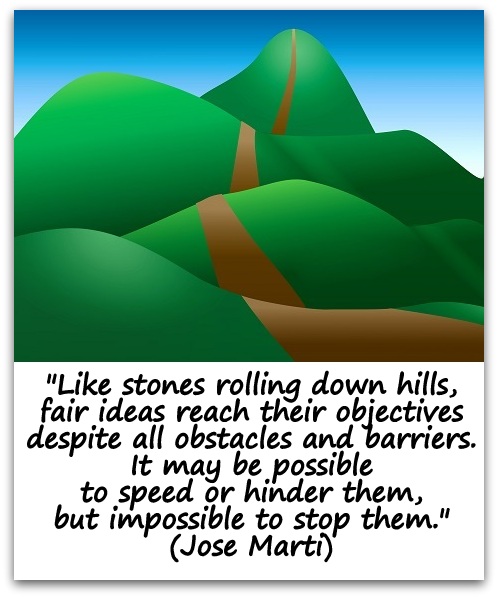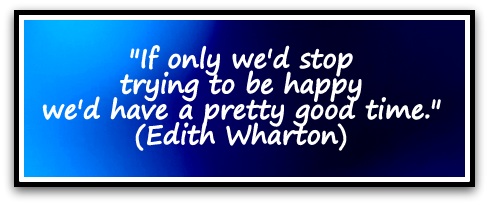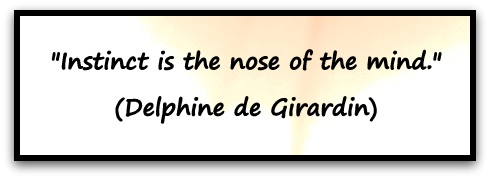Coaching Quote of the Day 10th February 2015

“Like stones rolling down hills, fair ideas reach their objectives despite all obstacles and barriers. It may be possible to speed or hinder them, but impossible to stop them.”
(Jose Marti)

“Like stones rolling down hills, fair ideas reach their objectives despite all obstacles and barriers. It may be possible to speed or hinder them, but impossible to stop them.”
(Jose Marti)

“It’s a funny thing about life; if you refuse to accept anything but the best, you very often get it.”
(W. Somerset Maugham)

“If only we’d stop trying to be happy we’d have a pretty good time.”
(Edith Wharton)

“Instinct is the nose of the mind.”
(Delphine de Girardin)
In this week’s guest post Ling Wong uses her expertise and knowledge as she shares:

A lot of business trainings tell us to sell coaching packages instead of single sessions, and raise our fees while we are at it so we can earn more, work less and have more energy to deliver our best services to our clients. Some of these trainings probably showed you how to design a program and price it.
Sounds good in theory, but… let me ask you – how much are your clients actually paying you? Do you consider the amount you are paid “premium”? (hmm, can you take just one or two new clients a month to pay the bills and more?)
Maybe you have a premium package sitting somewhere on your website, but you somehow have never been paid a “premium” fee; or you revert back to selling the “old” lower-cost packages when the rubber meets the road, i.e. during your sales conversation, because fears and doubts creep in and you chicken out.
If you (intellectually) know offering a premium package is better for your business, and you also have the knowledge to create the package – why aren’t you selling it? Where is the disconnect?
YOU, hold the answer. It’s all in your head.
Everything can sound good on paper, until it comes time to ask for the money.
There are a lot of fears, pre/misconceptions and judgments around “selling”, self-worth and value. Until you bust through these mindset hurdles, you will never feel completely comfortable during a sales conversation.
Your comfort level in asking to get paid is proportional to how much you ultimately get paid.
Nobody likes being pushed into buying, and we may perceive people selling to be “bad” because some salesperson gave us bad experience. If you had bad experience with sales people, it is easy to equate selling as “dishonest,” and who wants to be perceived as such? Of course you don’t want to, so you hold back from selling.
Plus, there are many unfavorable images we associate with people doing selling – e.g. the used car salesman, the late-night infomercial dude, even that pushy MLM friend who won’t let you off the hook until you reluctantly sign up for stuff that you don’t want.
What if I tell you, selling = serving? What if you can serve your potential clients while you sell them your services? Educational marketing is a great example. You give people information and provide value to raise awareness about a problem. When they understand the problem they have actually has a solution and you, standing right there, provides that service – they will want to seek you out without you pushing your wares.
I sign a lot more clients after I changed my approach in my discovery sessions from constantly worrying about “what can I say or ask to get them to buy my stuff?” to “what questions can I ask to help this person see a solution to her challenges?” This change in attitude can give the energy behind sales conversations a major overhaul.
![]() How can you lead your potential clients into exploring working with you by serving them?
How can you lead your potential clients into exploring working with you by serving them?
What kind of selling works? Genuine selling. The kind that you don’t hide behind scripts and templates. The kind that you put yourself forward and connect with your potential clients. But our fears are making us hide… instead of making the connection so critical to getting “yes” from potential clients.
The Fear of Not Being Good Enough can make you feel that you, being yourself, are not enough. It makes you feel there gotta be a script that holds the key to the perfect sales conversation. Maybe you fear that you don’t know enough so you keep babbling on about what you know and where you were trained… completely negating the potential client (who just wants to be heard and be given a damn solution!)
Don’t forget that little voice in your head that keeps saying “who are you to ask for that much money?”
The Fear of Not Being Worthy can cause you to confuse “self-worth” to what people are paying you for – i.e. our services that will give them results. When you don’t feel worthy of being paid, guess what… you don’t get paid!
The Fear of Lack can make you discount or settle for the client purchasing a smaller package even though you know she needs something more extensive because you don’t want to end up with nothing! By settling for less, at least you get the client to pay you something… (note how this makes you come from a place of lack, and not one of service)
The Fear of Being Vulnerable can get you to puff up as a protective mechanism, setting up a wall that prevents you from deeply connecting with your potential clients (people buy high-ticket items with emotions, you need to make that connection). Or, maybe you are afraid of being criticized so you hide from having conversations with potential clients or JV partners. If you hide, they can’t find you!
The Fear of Rejection can make you not ask for more money under the misconception that you will get more “no’s” if your price is higher. If you have this fear, the problem is not the price, the problem is you not having figured out how to communicate the value you deliver.
![]()
Can you recognize when you fears kick in during your sales conversations?
In this article, I explored money boundary and codependency extensively. Here is the highlight:
When your boundary is overstepped, it is you who allows that to happen.
![]() If it’s your boundary crime to commit, can you recognize your triggers and “rehearse” what you can do or say in those situations?
If it’s your boundary crime to commit, can you recognize your triggers and “rehearse” what you can do or say in those situations?
I have a bone with the phrase “charge what you are worth” – I explained it in this post.
If you can separate your self-worth from the value you deliver through your program, then the question “how can my time be worth that much” will not even enter the equation.
Focus on the value your clients get out of your program or service package, not how much time you spend on the phone with them.
If they get a more out of your service than what they pay you, then offering them your package is doing them a service. The key, again, is to communicate effectively so they understand the value of your program, and the impact it has on their lives.
 Write down how your work impacts your clients in the areas of health, career, finance, relationship and personal growth. Then put a monetary value (wherever possible) against each item. Now, add it all up and see for yourself how much value you deliver. Can you charge more?
Write down how your work impacts your clients in the areas of health, career, finance, relationship and personal growth. Then put a monetary value (wherever possible) against each item. Now, add it all up and see for yourself how much value you deliver. Can you charge more?
***
Selling, and selling high-ticket items, is not scary. You can sell more with integrity by having the right mindset and perspective, overcoming your fears, strengthening your boundaries, and properly communicating the value of your offer.
Ling offers “Business Soulwork + Marketing Activation” to help coaches nail their Messages, claim their Superpowers and muster up the Guts to monetize their Truth so they can build a purposeful and profitable Personality-Driven business that is a full expression of their individuality and creativity.
Through her “left brain meets right brain” approach, Ling helps her clients tap into their intuition and ground those light bulb moments with practical strategies and marketing tactics to build a profitable and sustainable business.
Ready to Nail Your Message, Claim Your Superpowers and Monetize Your Truth for a Personality-Driven business? Get your FREE “Monetize Your Truth Mindset + Marketing Training” here.

“We are not the same persons this year as last; nor are those we love. It is a happy chance if we, changing, continue to love a changed person.”
(W. Somerset Maugham)

“I’m a great believer in fate. I think things happen in spite of, and despite, yourself.”
(Randolph Scott)

Each Thursday I share the most RT’d quote(s) from the blogs twitter account over the previous week. Last week the most RT’d tweet was:
“People may hear your words, but they feel your attitude.”
(John C. Maxwell)
Tweeted on 27th January
The quote with the next highest amount of RT’s was:
“A mind is like a parachute. It doesn’t work if it isn’t open.”
(Frank Zappa)
Tweeted on 31st January

Many thanks to everyone who shared the quotes above and the other quotes from last week. I know that there are various aspects that can influence if a quote attracts your attention – if you saw the tweet, personal style, if it speaks to something happening in your life at that moment etc.

(For those of you as geeky as I am and wondering what tool I’m using to measure individual RT’s this week I’ve been playing with www.twitonomy.com)